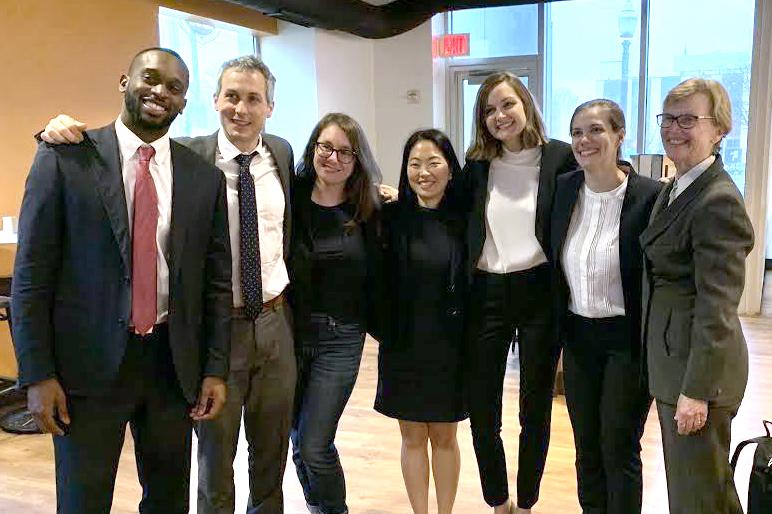Columbia Law’s Mass Incarceration Clinic Wins Major Case in Federal Court
Citing written and oral arguments made by five students, a U.S. District Court Judge ruled that a Connecticut prisoner’s permanent solitary confinement violates the Constitution’s protection against cruel and unusual punishment.
In a stunning decision handed down on August 27, Chief Judge Stefan R. Underhill ruled in favor of a Connecticut prisoner contesting the constitutionality of his permanent solitary confinement while serving a life without parole sentence. He was represented by five students in Columbia Law School’s Challenging the Consequences of Mass Incarceration Clinic under the supervision of Clinical Professor of Law Brett Dignam.
In written briefs and oral arguments, which the students presented in Underhill’s courtroom in April, they maintained that the treatment of their client, Richard Reynolds, violated parts of the Constitution, namely the Eighth Amendment’s prohibition of cruel and unusual punishment, the 14th Amendment’s due process and equal protection clauses, and the ex post facto and bill of attainder clauses.
In his ruling, Underhill, who serves on the U.S. District Court for the District of Connecticut, sided with the students on four of the five claims (one was deferred for future consideration). He issued a permanent injunction order that enjoins the defendants—who include the past and present commissioners of corrections, various wardens, and a prison psychologist and psychiatrist—from placing Reynolds in “special circumstances high-security status,” the harshest form of solitary confinement.
“I am incredibly happy for Mr. Reynolds,” clinic student Caleb King ’20 said the day after the ruling. “After months of anticipation, the ruling was truly tremendous news. I am simply very grateful to have been given the opportunity to assist in advocating for his fundamental rights.”
The ruling prohibits the state from keeping Reynolds alone in a cell for more than 21 hours a day, segregating him from a general prison population, limiting his recreational activity to a maximum of two hours per day, and preventing him from having physical contact with his family and other visitors. Furthermore, Underhill ordered that no current or future inmate may be subjected to the Connecticut statute that had dictated the conditions of Reynolds’ confinement.
“Our client is very grateful that Judge Underhill carefully considered and rigorously examined his claims,” said Dignam, who is also the Law School’s vice dean of experiential education. “This was and continues to be an extraordinary experience for the students. They have demonstrated excellence throughout—from their close collaboration with each other to their dedicated commitment to their client. They conducted scorched-earth legal research and produced eloquent and elegant arguments, both in writing and on their feet.”
In his 57-page decision, Underhill quoted extensively from the students’ brief and drew from their research. “The fact that people commit inhumane crimes does not give the state the right to treat them inhumanely,” he wrote. “The Defendants knew or reasonably should have known of the serious risks of harm to Reynolds from his conditions of confinement; their failure to ameliorate those conditions reflects deliberate indifference.”
Underhill gave corrections officials 30 days to implement his decision and said he will hold a hearing on damages to determine the scope and liability of each of the defendants. The Connecticut Attorney General’s office quickly filed a motion for an immediate temporary stay of the injunction, claiming that 30 days was too little time for the corrections department to safely move Reynolds along with 10 other men who have been subjected to the same form of solitary confinement to the general population of another prison.
On September 3, Dignam and her students filed a brief opposing the defendants' motion to stay, which the court denied with respect to Reynolds. The defendants must comply with the injunction by September 26. The students and Dignam will continue to work with their client throughout the rest of the process.
UPDATE: On March 11, 2021, the U.S. Court of Appeals for the 2nd Circuit upheld the District Court's ruling that Connecticut's treatment of the Mass Incarceration Clinic's client, Richard Reynolds, was unconstitutional and violated the 14th Amendment's equal protection and bill of attainder clauses. Hayle Malcolm '19 developed and argued the bill of attainder claims at summary judgment. Building on the work of Ruth O'Herron '18 and Carol Guerrero '19, Mary Marshall '20 developed and argued the equal protection claims. Marshall, Caleb King '20, and Sarah Hong Lin '20 researched and developed the appellate arguments.
